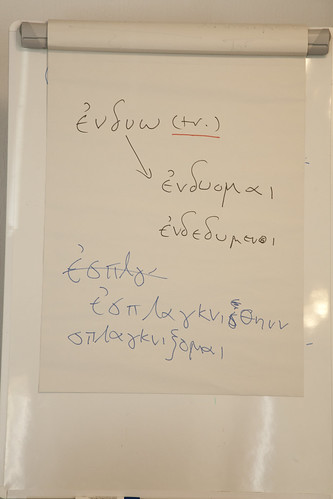I'm delighted to announce that booking is open for the Latin Mass Society's annual residential Latin and New Testament Greek course.
at Park Place Pastoral Centre, Wickham, Fareham, Hampshire PO17 5HA.
You can get there by train or car; it's set in very pleasant grounds, not far from Southampton.
The tutors are the same as last year: Fr John Hunwicke, who will also be celebrating Mass each day; Nathan Freeman; and, for the Greek, Matthew Spencer.
The fees are very low and there are generous discounts for clergy, seminarians, and students.
There is some very interesting advice on learning Latin without a teacher by a Latinist called Carla Hurt; this can be read in full here. She says some interesting things about some of the well-known learning techniques which have acquired a cult-like following, but her positive suggestions are also important. A key passage:
As a language teacher, I have found that my students’ scores in grammar tests have had little to no correlation to their scores in broader interpretive skills such as translation. This suggests that explicit knowledge of parts of the language is a separate beast from the actual ability to use and understand the language.
... meaningful activity is essential to language learning, because making form-meaning connections is the basis of learning a language. Any activity which does not genuinely engage with meaning is missing a crucial element. In order to associate all the various words, phrases, grammar, and syntax with their meaning, we need to encounter them many times in contexts where their meaning matters.
On the first claim what she actually shows, with a rather small sample, is that knowledge of grammar is less highly correlated to outcomes than knowledge of vocabulary, which I'm sure we could all have told her in advance. Nevertheless, the only way anyone is going to tell the difference between
Marcus Sextum oppugnat
and
Marcum Sextus oppugnat
or, heaven help us,
Marcus Sextum oppugnet
is by the kind of knowledge tested in those boring grammar tests. It's not the be-all and end-all, but this knowledge can't simply be left out.
However, she is certainly correct that meaningful activity is a huge boon in all language learning. If you are interested in the Latin of the Mass you can't do better than use the texts of the Mass to learn it.
The Latin Mass Society's Simplicissimus book does this: many of the examples it uses are familiar, interesting, or memorable. The book works up to tackling passages from the Lectionary, the Propers of Corpus Christi, the Roman Canon, and similar texts. The same spirit animates the Residential Course.
Support the Latin Mass Society


Any three year old child in ancient Rome would have been able to understand the difference between "Marcus Sextum oppugnat" and "Marcum Sextus oppugnat", without having the slightest inkling of "the kind of knowledge tested in those boring grammar tests". Knowing grammar is necessary if you want to *explain* the difference between the sentences, but not at all necessary to understanding what they mean.
ReplyDeleteHe would have had the *knowledge* which is *being tested* in those tests. You are confusing the knowledge which is the real target of the tests with the way the tests seek to find out if you have it.
Delete